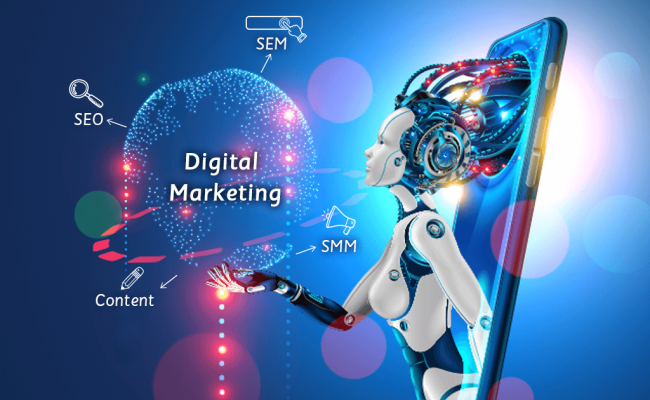
The Digital Age Playbook: Mastering AI Marketing for Measurable Growth
September 17, 2025
From Imagination to Innovation: AI’s Role in Advertising’s Future
September 17, 2025In today’s digital landscape, marketing professionals constantly seek innovative ways to stay ahead of the competition and effectively reach their target audience. One such innovation that has taken the marketing world by storm is using artificial intelligence (AI) tools. AI has revolutionized how marketing campaigns are planned, executed, and measured. In this blog post, we will explore how AI tools are transforming marketing strategies and helping businesses dominate the digital landscape.

I. Understanding AI in Marketing
Artificial intelligence refers to developing computer systems that can perform tasks that typically require human intelligence. These systems are designed to learn from data, recognize patterns, make decisions, and perform actions with minimal human intervention. AI enables marketers to automate and optimize various processes, analyze data on a large scale, and deliver personalized experiences to consumers.
Role of AI in Marketing
AI plays a pivotal role in marketing by providing marketers with powerful tools and insights to enhance their strategies. It allows marketers to analyze vast amounts of data quickly and efficiently, enabling data-driven decision-making. AI tools can uncover valuable insights about consumer behavior, preferences, and trends, which can be used to create highly targeted marketing campaigns. Additionally, AI enables the automation of repetitive tasks, freeing up time for marketers to focus on strategic planning and creative endeavors.
Benefits of using AI in Marketing
The use of AI in marketing offers several key benefits for businesses. These include:
Improved Efficiency: AI automates repetitive and time-consuming tasks, such as data analysis and reporting, allowing marketers to allocate their time and resources more effectively.
Enhanced Personalization: AI tools can analyze large datasets to create detailed customer profiles, enabling marketers to deliver personalized experiences and targeted content to individual consumers.
Real-time Insights: AI-powered analytics provide marketers with real-time insights into campaign performance, allowing for quick adjustments and optimizations to maximize results.
Cost Savings: By automating processes and improving efficiency, AI helps reduce costs associated with manual labor, enabling businesses to achieve better ROI.
Competitive Advantage: AI continues to revolutionize marketing strategies, providing businesses a competitive edge in the digital landscape.

II. AI Tools for Market Research and Analysis
In the ever-evolving world of marketing, data is vital. AI tools have transformed market research and analysis, enabling marketers to gather and interpret vast amounts of data with unprecedented speed and accuracy.
AI-powered data analytics
AI-powered data analytics tools allow marketers to extract valuable insights from large datasets. These tools can analyze complex patterns and trends, identify correlations, and generate actionable recommendations. For example, AI algorithms can analyze customer behavior data to uncover hidden patterns and preferences, helping marketers understand their target audience better.
Predictive modeling and forecasting
AI tools enable predictive modeling and forecasting, allowing marketers to anticipate future trends and make informed decisions. By analyzing historical data and identifying patterns, AI algorithms can predict customer behavior, market trends, and demand for products or services. This information is invaluable for marketers as it helps them develop effective marketing strategies and allocate resources efficiently.
Consumer sentiment analysis
Understanding consumer sentiment is crucial for effective marketing campaigns. AI-powered sentiment analysis tools can analyze social media posts, customer reviews, and other sources of customer feedback to gauge consumer sentiment toward a brand or product. Marketers can use these insights to identify areas of improvement, address customer concerns, and tailor their marketing messages accordingly.

III. AI Tools for Content Creation and Optimization
Creating compelling and relevant content is essential for engaging with customers and driving conversions. AI tools have revolutionized content creation and optimization processes, enabling marketers to produce high-quality content at scale.
AI-generated content
AI-generated content refers to using AI algorithms to create written or visual content. These algorithms can analyze existing content, identify patterns, and generate new content that aligns with specific criteria. For example, AI can create blog posts, social media captions, or even design visuals based on predefined parameters. While AI-generated content can be a valuable tool for content creation, ensuring that the content maintains a human touch and aligns with the brand’s voice is essential.
Natural language processing
Natural language processing (NLP) is a branch of AI focusing on interactions between computers and human language. NLP-powered tools can analyze and understand written or spoken language, enabling marketers to gain insights from customer interactions and feedback. For example, chatbots with NLP can understand customer queries and provide relevant responses, improving customer service and engagement.
SEO optimization with AI
Search engine optimization (SEO) is crucial for improving a website’s visibility in search engine results. AI tools can analyze vast amounts of data to identify relevant keywords, optimize on-page elements, and provide recommendations for improving a website’s SEO performance. Additionally, AI can help analyze search engine algorithms and trends to ensure marketers stay updated and adapt their SEO strategies accordingly.

IV. AI Tools for Personalized Marketing
Personalized marketing is all about delivering tailored experiences and content to individual customers. AI tools play a pivotal role in enabling marketers to understand their customers better and deliver personalized marketing campaigns.
Customer segmentation and targeting
AI tools can analyze customer data, such as demographics, browsing behavior, and purchase history, to segment customers into distinct groups. Marketers can then tailor their marketing messages and offers to each segment, ensuring that the right message reaches the right audience at the right time. This level of segmentation and targeting is crucial for maximizing conversion rates and improving customer satisfaction.
Dynamic content recommendations
AI-powered recommendation engines can analyze customer behavior and preferences to provide personalized content recommendations. For example, streaming platforms use AI algorithms to suggest movies or shows based on a user’s viewing history. Similarly, e-commerce websites can recommend products based on a customer’s past purchases or browsing behavior. These personalized recommendations enhance the customer experience and drive engagement and conversions.
Chatbots and virtual assistants
Chatbots and virtual assistants powered by AI have become increasingly common in customer service and marketing. These AI tools can engage in real-time conversations with customers, answering their queries, providing product recommendations, or even assisting in the purchase process. Chatbots offer round-the-clock support and can handle multiple customer interactions simultaneously, improving efficiency and customer satisfaction.

V. AI Tools for Social Media Marketing
Social media has become a powerful marketing channel, and AI tools have significantly enhanced marketers’ capabilities to leverage their potential.
Social media listening and sentiment analysis
AI-powered social media listening tools can monitor conversations, mentions, and hashtags related to a brand or industry across various social media platforms. These tools can analyze sentiment, identify trends, and gather valuable insights about customer preferences and opinions. Marketers can use this information to tailor their social media content, engage with their audience, and promptly address customer concerns or feedback.
Automated social media posting and scheduling
Managing social media accounts and posting content consistently can be time-consuming. AI tools simplify this process by allowing marketers to automate social media posting and scheduling. These tools can analyze engagement patterns, identify optimal posting times, and automatically publish content at the most opportune moments. By streamlining social media management, marketers can focus on creating engaging content and building meaningful connections with their audience.
Influencer identification and engagement
Identifying relevant influencers and building partnerships can amplify a brand’s reach and credibility. AI-powered tools can analyze social media data, engagement metrics, and audience demographics to identify influencers who align with a brand’s values and target audience. Additionally, AI can help track influencer performance, measure the impact of influencer campaigns, and manage influencer relationships effectively.

VI. AI Tools for Advertising and Campaign Management
Advertising plays a crucial role in marketing, and AI tools have revolutionized the way campaigns are managed, optimized, and targeted.
Programmatic advertising
Programmatic advertising uses AI algorithms to automate the buying and selling of ad space in real-time. AI-powered platforms can analyze user data, demographics, and browsing behavior to deliver highly targeted ads to the most relevant audience. This automation ensures efficient ad placement, maximizes ad spend, and improves overall campaign performance.
Ad targeting and retargeting
AI tools enable precise ad targeting by analyzing user data and behavior. Marketers can create detailed customer profiles and leverage AI algorithms to serve ads to specific segments or individuals most likely to convert. Additionally, AI-powered retargeting allows marketers to display personalized ads to users who have previously interacted with their brand, increasing the chances of conversion.
Performance tracking and optimization
AI tools provide real-time insights into campaign performance, allowing marketers to monitor key metrics, such as impressions, clicks, conversions, and ROI. These tools can identify patterns, optimize ad placements, and make data-driven adjustments to campaigns in real-time. AI algorithms can also test different ad variations and optimize them for better performance, ensuring that marketers achieve the best possible results from their advertising efforts.

VII. AI Tools for Customer Relationship Management
Maintaining strong customer relationships is essential for long-term business success, and AI tools are transforming customer relationship management (CRM) strategies.
AI-powered customer service
AI-powered chatbots and virtual assistants can handle customer inquiries, support, and resolve common issues. These tools use natural language processing and machine learning algorithms to understand customer queries and provide accurate and timely responses. AI-powered customer service helps businesses offer 24/7 support, improve response times, and enhance customer experience.
Chatbots for customer support
Chatbots are becoming increasingly sophisticated and can handle complex interactions with customers. AI-powered chatbots can simulate human-like conversations, understand context, and provide personalized assistance. They can help customers with product recommendations, troubleshooting, and even process transactions. Chatbots streamline customer support, reduce wait times, and provide consistent and efficient service across multiple channels.
Personalized customer experience
AI tools enable marketers to deliver personalized customer experiences at scale. By analyzing customer data, AI algorithms can identify individual preferences, purchase history, and browsing behavior to offer tailored product recommendations, personalized offers, and customized content. This level of personalization strengthens customer loyalty, increases engagement, and drives repeat business.

VIII. The Future of AI in Marketing
As AI continues to evolve, its impact on marketing is expected to grow exponentially. However, with this advancement come important considerations.
Ethical considerations
As AI becomes more integrated into marketing strategies, it is crucial to ensure ethical practices. Marketers must be transparent about data collection and usage, respect customer privacy, and adhere to relevant regulations. Striking a balance between personalization and data protection is critical to maintaining trust and building long-term customer relationships.
Impact on jobs and human creativity
The rise of AI in marketing raises concerns about the future of specific job roles. While AI can automate repetitive tasks and data analysis, it cannot replicate human creativity, empathy, and intuition. Instead of replacing jobs, AI tools can empower marketers to focus on strategic planning, creative imagination, and building authentic connections with their audience.
Integration of AI with other emerging technologies
AI’s potential is amplified when integrated with other emerging technologies. For example, combining AI with augmented reality (AR) can create immersive brand experiences, and AI-powered voice assistants can enhance voice search optimization. The integration of AI with blockchain technology can improve data security and transparency. Marketers should explore these synergies to stay at the forefront of technological advancements and gain a competitive edge.
AI tools have revolutionized marketing strategies, enabling businesses to dominate the digital landscape. From market research and content optimization to personalized marketing and customer relationship management, AI is reshaping how marketers connect with their audience and drive business growth. As AI advances, marketers must embrace its potential, adapt to evolving technologies, and navigate ethical considerations to unlock new opportunities for success.


